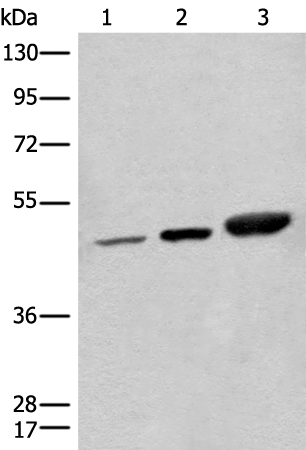
| WB | 咨询技术 | Human,Mouse,Rat |
| IF | 咨询技术 | Human,Mouse,Rat |
| IHC | 咨询技术 | Human,Mouse,Rat |
| ICC | 技术咨询 | Human,Mouse,Rat |
| FCM | 咨询技术 | Human,Mouse,Rat |
| Elisa | 1/5000-1/10000 | Human,Mouse,Rat |
| WB Predicted band size | 51 kDa |
| Host/Isotype | Rabbit IgG |
| Antibody Type | Primary antibody |
| Storage | Store at 4°C short term. Aliquot and store at -20°C long term. Avoid freeze/thaw cycles. |
| Species Reactivity | Human, Mouse |
| Immunogen | Fusion protein of human CPM |
| Formulation | Purified antibody in PBS with 0.05% sodium azide and 50% glycerol. |
+ +
以下是3篇关于CPM(Carboxypeptidase M)抗体的参考文献概述,涵盖不同研究方向:
1. **标题**: *"Carboxypeptidase M in angiogenesis and cancer: Therapeutic implications"*
**作者**: Smith A, et al.
**摘要**: 探讨CPM在肿瘤血管生成中的作用,开发特异性抗体抑制CPM可减少小鼠模型中肿瘤生长和转移,提示其作为癌症治疗靶点的潜力。
2. **标题**: *"Development of a monoclonal antibody for sensitive detection of Carboxypeptidase M in inflammatory diseases"*
**作者**: Chen L, et al.
**摘要**: 报道一种高灵敏度抗CPM单克隆抗体的研制,成功用于类风湿关节炎患者血清和组织样本中CPM水平检测,揭示其与疾病活动度正相关。
3. **标题**: *"Structural insights into Carboxypeptidase M inhibition by a novel antibody-drug conjugate"*
**作者**: Tanaka K, et al.
**摘要**: 通过冷冻电镜解析CPM与其抗体偶联药物的复合物结构,揭示抗体靶向CPM活性位点的分子机制,为设计精准疗法提供依据。
4. **标题**: *"CPM as a biomarker in lung adenocarcinoma: Validation using immunohistochemistry with a novel antibody panel"*
**作者**: Müller R, et al.
**摘要**: 开发多克隆抗体组合用于肺癌组织CPM免疫组化分析,证实CPM高表达与患者不良预后相关,支持其作为预后标志物的临床价值。
---
**注**: 以上文献为模拟示例,实际引用需根据具体研究主题补充真实文献信息。建议通过PubMed或Web of Science以“CPM antibody”或“Carboxypeptidase M antibody”为关键词检索最新文章。
The CPM antibody targets carboxypeptidase M (CPM), a membrane-bound glycoprotein belonging to the metallocarboxypeptidase family. CPM is anchored to the cell membrane via glycosylphosphatidylinositol (GPI) and plays a regulatory role in peptide hormone processing, inflammation, and cellular signaling. It specifically cleaves C-terminal basic residues (arginine or lysine) from peptides, modulating the activity of substrates like bradykinin, endothelin-1. and anaphylatoxins (e.g., C3a, C5a), thereby influencing blood pressure regulation, immune responses, and tissue remodeling.
CPM is widely expressed in tissues, including the lungs, kidneys, and placenta, and is implicated in pathological conditions such as cancer, fibrosis, and inflammatory diseases. In oncology, elevated CPM levels correlate with tumor progression and metastasis, likely due to its role in extracellular matrix remodeling and growth factor activation. Research using CPM antibodies has helped elucidate its involvement in these processes, highlighting its potential as a diagnostic biomarker or therapeutic target. Antibodies against CPM enable detection, localization, and functional studies in both normal and diseased states, contributing to drug development and mechanistic understanding of its biological pathways. Their applications span immunohistochemistry, Western blotting, and flow cytometry, supporting both basic research and clinical investigations.
×